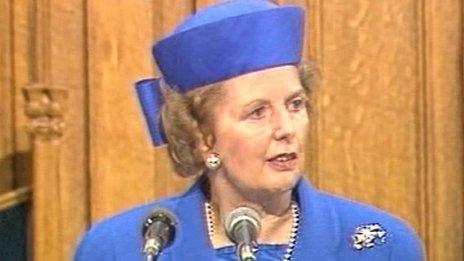Margaret Thatcher: Scottish politicians' reaction
- Published

Sir Malcolm Rifkind said Baroness Thatcher was an "uncompromising" political figure
Scottish politicians have paid tribute to Margaret Thatcher, Britain's first woman Prime Minister, who has died.
Despite always affirming a strong bond with Scotland, she was a divisive political figure.
First Minister Alex Salmond said Baroness Thatcher was "truly formidable".
Scottish Conservative leader, Ruth Davidson, also paid tribute saying she was "one of the truly great Prime Ministers".
Mr Salmond said the former Conservative Party Prime Minister's "policies defined a political generation" for many people in Scotland.
"No doubt there will now be a renewed debate about the impact of that legacy", he continued.
"Today, however, the proper reaction should be respect and condolences to her family."
Ms Davidson praised Lady Thatcher's policies, including extending the right for people to buy their council house.
Ruth Davidson said: "She defended Britain's sovereignty, helped win the cold war, empowered thousands to own their own home by democratising property ownership and smashed the glass ceiling.
"My thoughts are with her family."
Scottish Labour leader Johann Lamont said: "I came into politics to fight the ideology and values of Margaret Thatcher which I believe damaged our country. But today is not a day to debate that.
"Today is a day to offer the deepest condolences to her family, friends and all who loved her.
"No-one can deny she made a deep mark on the history of this country."
'Economic achievements'
Under Baroness Thatcher's leadership the Conservative government implemented social and economic policies which were unpopular in Scotland, including the Community Charge or poll tax.
The introduction of the poll tax, which took place in Scotland in 1989 - 12 months before the rest of the UK, led to widespread protests and a lasting animosity towards the Conservative party in Scotland.
Sir Malcolm Rifkind, served as Secretary of State for Scotland in her cabinet, said many of her major achievements also continued to be reflected in public opinion.
He told BBC Scotland: "In a sense what made her so magnificent is occasionally what made her a very difficult and controversial character because she had very strong views, she put them forward uncompromisingly.
"She didn't mind being challenged, indeed she would listen with great care if she thought the person challenging her actually knew what they were talking about and she could change her mind and opinions, but only on the basis of solid evidence and solid argument.
"She would not be influenced by the fact it would be unpopular. That she despised, as well as disapproved of."
Baroness Thatcher's economic policy was also praised by Iain McMillan, director of CBI Scotland. He said: "It is all too easy to overlook the dreadful state that the UK economy was in at that time and the challenges that she and her government faced.
"Through sheer tenacity and immense courage, Margaret Thatcher changed the UK economy for the better and laid the ground for years of greatly improved economic performance."
'Amazingly divisive'
The former chief political correspondent of the BBC, John Sergeant said: "It's interesting that her two election campaigns that really mattered were 1979 and '83 - both of them started in Perth. That's where she made her opening speech.
"So Scotland did matter to her a great deal, but she was always rather dismayed that she didn't do very well in Scotland.
"Her heart used to sink travelling north, as it did for Tony Blair. Once the poll tax was hung round her neck, and of course the miners dispute and everything else, she was always an amazingly divisive figure in Scotland and Tory fortunes north of the border never recovered from that early period."